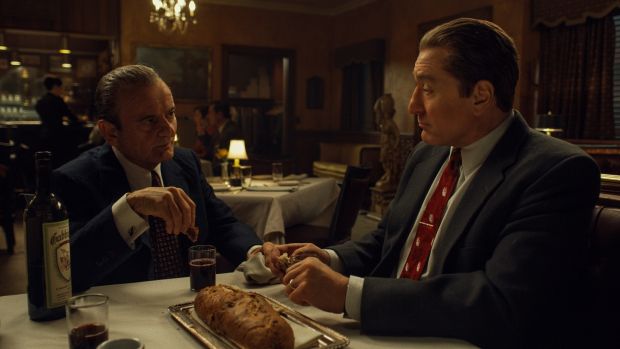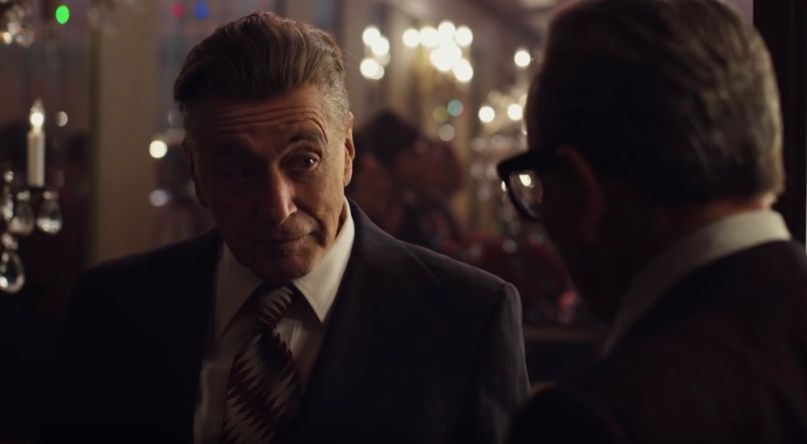
I know that I’m late to the party with these comments, especially since I saw The Irishman at its first Silicon Valley screening. Since then, I’ve been ruminating on why it’s so good.
The titular Irishman is Frank Sheeran (Robert De Niro), a WW II vet, who starts out as a truck driver who diverts his meat deliveries to his own “buyers”. He meets Mafia leader Russell Bufalino (Joe Pesci), who mentors him, and Sheeran becomes a professional hit man. Through Bufalino, Sheeran also becomes close to Teamster leader Jimmy Hoffa (Al Pacino). Like Hoffa, Sheeran and Bufalino were real people. Scorsese takes Sheeran’s life through the decades in this gangland saga.
The Irishman is based on real events. Even the Frank Sheeran appreciation banquet with Jimmy Hoffa and Jerry Vale really happened. Of course, Scorsese ‘s solution to the What Happened to Jimmy Hoffa mystery is imagined, but it does conform to one of the more credible hypotheses.
Besides Bufalino and Sheeran, the characters of real life gangsters Tony Pro Provenzano, Fat Tony Salerno, Angelo Bruno and Crazy Joe Gallo figure in The Irishman’s plot, and we also glimpse Allen Dorfman, Tony Jack Giacalone, Joe Colombo, Sam Giancana and Albert Anastasia.
There is plenty of familiar mob lore – I particularly love the reference to a nickname, “the OTHER Whispers“. But this is a less glamorized Mafia than is usual for a gangster flick – the violence is decidedly unheroic. The toxic impact upon family members is unvarnished.
The Irishman is also a comment on the decline of the Mob. By the end, for all the omerta, we’ve reached a world where these guys (except for Frank Sheeran) routinely rat each other out. When we see the aged Sheeran in the retirement facility, we understand that his storied criminal career hadn’t gotten him any more creature comfort than if he had retired with the Teamster’s pension of an honest trucker. – and he might have instead had the support of an affectionate family.
DeNiro is excellent in The Irishman, as are all the cast members. I really enjoyed Steven “Little Steven” Van Zandt in his cameo as crooner Jerry Vale. British actor Stephen Graham has gotten a lot of plaudits for his as Tony Pro. Four other performances stand out for me.
Joe Pesci has made his acting career playing hair-trigger, tinderbox gangsters. In contrast, his Russell Bufalino is completely contained and ever in control. At one point, Hoffa refuses his request, and Bufalino does not explode or threaten; Pesci’s eyes barely register that Bufalino has made n irreparable decision.
Al Pacino, of course can play chilly (Michael Corleone in The Godfather or volatile (in Dog Day Afternoon and thirty other roles). Here, he perfectly captures Hoffa’s strong will, audacity and smarts (the key to his success) and his hotheadedness (his Achilles heel). This is one of Pacino’s many Oscar nomination-worthy performances.
Anna Paquin and Marin Ireland play the grown-up versions of Sheeran’s daughters. Sheeran’s murderous life has impacted them in ways that he will never understand. As adults, the daughters are no longer afraid of their father and become estranged from him. Paquin shows us her character’s feelings with very few lines. In one brief but riveting monologue, Ireland tries to connects the dot explicitly.

Hoffa is an especially interesting character who really hasn’t been captured onscreen as well as he is here. Hoffa was a strategic genius who recognized that putting every Teamster workplace under a single, unified national contract would give the union unmatched bargaining power – from the capacity to essentially shut down all of the shipping and transportation in North America. To accomplish that, he needed the Teamster locals on the coasts to temporarily stagnate their higher pay until the lower-paid locals in the middle of the country could catch up. Because the East Coast locals were mobbed up, he needed – and sought – the cooperation of the Mafia. So, his dalliance with the mob was strategic, aimed at getting him power for his members, not to personally enrich himself as would the garden-variety crook.
Netflix’s investment allowed Scorsese to use a computer special effect to alter the appearances of DeNiro (age 76), Pacino (79) and Pesci (76) so they could play flashback scenes of their characters thirty years before. I knew this technique was used before I saw The Irishman, but I didn’t notice it.
The Irishman is a three-and-a-half hour movie. As The Wife noted, that is indulgent. But it doesn’t drag, and I enjoyed every minute of Scorsese’s masterwork. I saw it in a theater, but The Irishman is streaming on Netflix.
Here’s a bonus treat: Jason Gorber dissects the soundtrack in The Slash.
